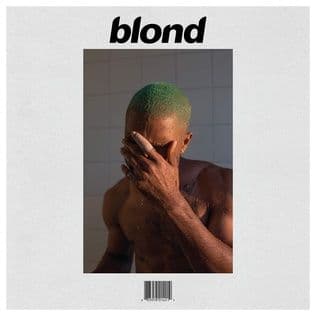Stargazing on a concept album that defies categorization in its own right, Frank Ocean’s endlessly intoxicating second album feels like a white painting where the colors slowly reveal themselves. **It’s like looking through a glass kaleidoscope made with colorful manifestations of instances in your life where you understood the world a bit better.**
Long sunsets with clouds illuminated by the last of the light against the darkest blue of the sky. The faint moon has replaced the stars that have appeared. In the warm wind, clothes are flapping. The distant glimmer of city lights and the faint sound of automobiles. Blonde causes me to notice perspectives I'm accustomed to, but they come from a world I've only known in dreams. **It's like seeing someone else's life - which is also strangely my own - be played back on film.**
Blonde was, to put it mildly, a cultural revolution. The pinnacle of Frank Ocean's artistry, songwriting and production can be analyzed as a modern interpretation of the myth of Pandora's Box, a fluid expulsion of angsty introspection that includes universally relatable themes of ambiguous sexuality and identity, the richly rewarding feeling of true romantic fulfillment and the subsequent disintegration of one’s soul and mentality when this love is torn limb from limb. **Frank Ocean transcends his artist persona as he reads aloud from this self-published library of memories and longings.** Ultimately, he serves as a mouthpiece for existential philosophy, personal growth, and a kind of awkward yearning for experiences that can only be felt alone in the dead of night.
This concept album, mostly produced by Frank himself, really defies categorization in its own right. One might be tempted to call it R'n'B. It is so much more. Push and stretch the word to the boundaries of the genre and you might get closer. Frank sets out to set up a surreal oneiric atmosphere around many of the songs. His craftsmanship is minimalist yet complex, with many tracks relying solely on his vocals, rock guitar and electric keyboard to carry them. As a result many of the instrumentals could have slipped to the dull side but Frank's warm voice and musical intuition do not let the tracks down.
___
For the listener, the transition from "Nikes" to "Futura Free" is made clear. Every song takes the listener farther from where they began. The objectives are not to complete the circle and just to reflect for the sake of reflecting. As a result, the artwork has a light and purposeful feel about it. In "Skyline To," the growth of the rising of the day is shown via the use of bird cries that reawaken dormant life from the clutches of sleep. A homage to the haze of somnolence, the strangely deconstructed lyrical material hears an echo in the haze of waking up to the light of day after a sound night's sleep.
The words of "Blonde" are cryptic and full of references, making it sound like a dream. To really appreciate what Frank has to give on the first couple of tracks, it takes a few listens. The tropical fantasy is maintained in Pink + White by lovely background voices while the instruments come and depart and start up where others left off. Yes, the background voices are really divine. (And they belong to Beyoncé.) Frank plays with the listener's emotions flying off the rails and their uncertainty. Nights intensifies as it becomes busier and busier, to the point where the music becomes tense. The lines sound like the offspring of a Facebook thread and a seance summoning session as the music stops and Frank switches to rapping over a different track. This track is undoubtedly the climax of the album.
Without a doubt, most of the lyrical content is solid and displays how skilled a storyteller Frank is despite the oneiric subject matter. Ivy is the tale of a shattered relationship, from which no one emerged unscathed and without bearing some of the blame for the intricate musical fabric. As the instruments squeal to announce the conclusion of the intimate jam session we have just been privy to, the scream that finishes the song ("Dreaming, dream on!") practically jeers at us to wake up from the daydream.
It is particularly the case on Solo where Frank is supported by resonating subdued vocals from none other than Jazmine Sullivan in a gospel following Frank's mother two cents in Be Yourself. Another occasion on which this is striking is the evening service that Godspeed provides - a personal favorite. When the melody collapses on itself and Kim Burrell's vocals rise on an extraterrestrial backdrop, we're left stargazing in a short and intense moment of bliss.
___
It's simple to feel like hiding. The four simple white walls that surround us can shield us from those forces as easily as they can shield us from the rain. The confusion and despair that pervade today's world continue to grow. However, being alone is not the same as being lonely, if you'll excuse the cliché (and if you can't, how did you make it this far into the review?). You have a variety of options for communicating, like using the blissfully white screen of your computer, tending to your garden and producing something useful, or just finding something you enjoy and indulging in its delights, letting it pour into you like moonlight. Blonde is aware of this requirement and will be more than pleased to assist you in this hopeful transmission.
The album concludes with a look back in the style of spliced-up old interviews with some of Frank's youthful buddies as well as his brother Ryan, who was about 11 at the time. A comfy keyboard plays in the background while the lads discuss who they are and what they want. Looped are carefree laughter that adults can't seem to get out. However, harsh static continuously intrudes, hinting at temporal distortions. The interview appears to have been conducted by Frank's younger brother, was taped when he was a toddler, and contains questions that wonderfully encapsulate infantile curiosity: wanting to know for the sake of knowing. When the interview begins, the same wonderful, nostalgia-driven instrumentals that featured on Be Yourself, Good Guy, and Facebook Story begin to play, and it always makes me grin. That's difficult to explain why, but it's one of the reasons I think this song is the ideal finale to this album: it simply works. This song takes two of the album's recurring themes, honesty with yourself and others, and drawing positives from all life experiences, and pushes them to two musical extremes, combining an unbelievably personal confession track with a straight up interview collage of silly childlike questions and genuine insight into the thoughts of the innocent. Frank wants to include both of them into this music and ensure that his listeners get the most out of it. As the track comes to a close, Frank chooses to finish the record by questioning his brother,
> How far is a light year?" "How far is a light year?
Of course, Frank doesn't want us to go and figure it out; he asks us this question in the hopes that we will answer it like a child. Because a youngster is unlikely to be aware of the distance of a light year, when they discover it, they are astounded that such vast space exists, prompting them to ask the two questions that Frank Ocean wants us to ask ourselves as often as possible: How far have we progressed? How far can we go?


